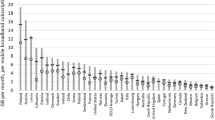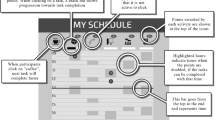Abstract
Generally, during the execution of the daily activity schedule, there is a mismatch between the plan and the reality. Faced with unexpected events, which affect the schedule, individuals need to reschedule their activities. In such situations, time is a crucial factor when rescheduling, as people feel time pressure because of the time constraints. Consequently, the rescheduling decision is made under the individual’s perceived time pressure (\({\varvec{P}\!\varvec{T}\!\varvec{P}}\)). \({\varvec{P}\!\varvec{T}\!\varvec{P}}\) does depend on not only the actual time pressure but also the individual’s characteristics. This paper aims to establish a model to simulate the individual decision behavior under \({\varvec{P}\!\varvec{T}\!\varvec{P}}\). Under different levels of \({\varvec{P}\!\varvec{T}\!\varvec{P}}\), individuals will choose different strategies to make the final decision based on their own characteristics. Our model proposes three decision strategies: optimal strategy under low-level \({\varvec{P}\!\varvec{T}\!\varvec{P}}\), salient strategy under medium-level \({\varvec{P}\!\varvec{T}\!\varvec{P}}\), and experience under high-level \({\varvec{P}\!\varvec{T}\!\varvec{P}}\). In addition, this paper argues that the choice probabilities within each strategy are affected by the empirical probabilities. The proposed strategy model for individuals’ rescheduling choices under \({\varvec{P}\!\varvec{T}\!\varvec{P}}\) is validated by running several experiments.







Similar content being viewed by others
Data availability
This paper does not involve any data or material.
Code availability
There is no code for this manuscript.
References
Rastegary H, Landy FJ (1993) The interactions among time urgency, uncertainty, and time pressure. In: Time pressure and stress in human judgment and decision making, pp 217–239. Springer
Crescenzi AMC (2019) Adaptation in information search and decision-making under time pressure. PhD thesis, The University of North Carolina at Chapel Hill
Batool T (2016) Time pressure and flexibility in daily agendas. Master’s thesis, UHasselt
Saleem R, Shah SAUH, Waqas M (2011) Effect of time pressure and human judgment on decision making in three public sector organizations of Pakistan. J Human Sci 8(1):701–712
Stern E (1999) Reactions to congestion under time pressure. Transport Res C Emerg Technol 7(2–3):75–90
Jinkyu J, Lee I, Kim J (2017) The effects of hover interface on users’ behavioral multitasking intention. Int J Human Comput Interact 33:537–548
Chen C, Chorus C, Molin E, Van Wee B (2016) Effects of task complexity and time pressure on activity-travel choices: heteroscedastic logit model and activity-travel simulator experiment. Transportation 43(3):455–472
Zhao H, Mualla Y, Tchappi IH, Galland S, Bellemans T, Yasar A (2020) Decision-making under time pressure when rescheduling daily activities. Proc Comput Sci 170:281–288
Sealy WI, Feigh KM (2020) Information modification for time-limited decision making. In: 2020 IEEE international conference on human-machine systems (ICHMS), pp 1–6. IEEE
Sealy WI, Feigh KM (2021) Impact of missing information and strategy on decision making performance. In: 2021 IEEE international conference on systems, man, and cybernetics (SMC), pp 3140–3145. IEEE
Higgins CD, Sweet MN, Kanaroglou PS (2018) All minutes are not equal: travel time and the effects of congestion on commute satisfaction in Canadian cities. Transportation 45(5):1249–1268
Phillips-Wren G, Adya M (2020) Decision making under stress: the role of information overload, time pressure, complexity, and uncertainty. J Decision Syst 1–13
Kelly JR, Karau SJ (1999) Group decision making: the effects of initial preferences and time pressure. Personal Social Psychol Bullet 25(11):1342–1354
Ibanez M, Czermak S, Sutter M (2009) Searching for a better deal-on the influence of group decision making, time pressure and gender on search behavior. J Econ Psychol 30(1):1–10
De Dreu CK (2003) Time pressure and closing of the mind in negotiation. Organ Behav Hum Decis Process 91(2):280–295
Noh S, Gmytrasiewicz PJ (2005) Flexible multi-agent decision making under time pressure. IEEE Trans Syst Man Cybern A Syst Humans 35(5):697–707
Tchappi IH, Galland S, Kamla VC, Kamgang J-C, Nono CMS, Zhao H (2019) Holonification model for a multilevel agent-based system. Pers Ubiquitous Comput 23(5–6):633–651
Tchappi IH, Galland S, Kamla VC, Kamgang JC (2018) Holonification of road traffic based on graph theory. In: International conference on cellular automata, pp 513–525. Springer
Najjar A, Mualla Y, Boissier O, Picard G (2017) AQUAMan: QoE-driven cost-aware mechanism for SaaS acceptability rate adaptation. In: International conference on web intelligence, pp 331–339. ACM
Rai VK, Mahanty B (2002) Dynamics of schedule pressure in software projects. In: Proceedings of the 20th international conference of the system dynamics Society, the system dynamics society, Palermo
Mualla Y, Najjar A, Vanet R, Boissier O, Galland S (2018) Towards a real-time mitigation of high temperature while drilling using a multi-agent system. In: RTcMAS@IJCAI, pp 77–92
Mualla Y, Najjar A, Boissier O, Galland S, Haman IT, Vanet R (2019) A cyber-physical system for semi-autonomous oil & gas drilling operations. In: 3rd IEEE international conference on robotic computing (IRC), pp 514–519. IEEE
Lerch FJ, Harter DE (2001) Cognitive support for real-time dynamic decision making. Inf Syst Res 12(1):63–82
Lau RY, Tang M, Wong O (2004) Towards genetically optimised responsive negotiation agents. In: Proceedings of the IEEE/WIC/ACM international conference on intelligent agent technology, 2004 (IAT 2004), pp 295–301. IEEE
Busemeyer JR, Townsend JT (1993) Decision field theory: a dynamic-cognitive approach to decision making in an uncertain environment. Psychol Rev 100(3):432
Pfannkuch M, Ziedins I (2014) A modelling perspective on probability. Probabilistic thinking: presenting plural perspectives, pp 101–116
Zhao H, Galland S, Knapen L, Bellemans T et al (2018) Agent-based dynamic rescheduling of daily activities. Proc Comput Sci 130:979–984
Goodwin P (2015) When simple alternatives to Bayes formula work well: reducing the cognitive load when updating probability forecasts. J Bus Res 68(8):1686–1691
Timmermans H, Arentze T, Joh C-H (2001) Modeling effects of anticipated time pressure on execution of activity programs. Transp Res Rec 1752(1):8–15
Ortega J, Hamadneh J, Esztergár-Kiss D, Tóth J (2020) Simulation of the daily activity plans of travelers using the park-and-ride system and autonomous vehicles: work and shopping trip purposes. Appl Sci 10(8):2912
Zhao H (2020) Agent-based model for the rescheduling of individual and collective daily activities under uncertainties. PhD thesis, Université Bourgogne Franche-Comté
Lee S, Jin Y, Woo S et al (2013) Approximate cost estimating model of eco-type trade for river facility construction using case-based reasoning and genetic algorithms. KSCE J Civil Eng 17(2):292–300
Cheng Y, Li Y, Yang J (2020) Novel approach of obtaining dynamic multi-attribute weight for intuitionistic fuzzy environment based on fractional integrals. Int J Fuzzy Syst 22(1):242–256
Gärling T, Gillholm R, Montgomery W (1999) The role of anticipated time pressure in activity scheduling. Transportation 26(2):173–191
Joh C-H, Arentze TA, Timmermans HJ (2001) Understanding activity scheduling and rescheduling behaviour: theory and numerical illustration. GeoJournal 53(4):359–371
Funding
This research is supported in part by the National Natural Science Foundation of China under Grant 72171172 and 62088101; in part by Shanghai Municipal Science and Technology, China Major Project under grant 2021SHZDZX0100; in part by Shanghai Research Institute of China Engineering Science and Technology Development Strategy, Strategic Research and Consulting Project, under grant 2022-DFZD-33-02; and in part by Chinese Academy of Engineering, Strategic Research and Consulting Program, under grant 2022-XY-100.
Author information
Authors and Affiliations
Contributions
Hui Zhao built the model and wrote the paper. Igor H. Tchappi made significant amendments to the content. Yazan Mualla and Stéphane Galland reviewed the paper content and checked the final version of the paper. On behalf of all authors, the corresponding author states that there is no conflict of interest.
Corresponding author
Ethics declarations
Competing Interests
The authors declare no competing interests.
Additional information
Publisher's Note
Springer Nature remains neutral with regard to jurisdictional claims in published maps and institutional affiliations.
Rights and permissions
Springer Nature or its licensor (e.g. a society or other partner) holds exclusive rights to this article under a publishing agreement with the author(s) or other rightsholder(s); author self-archiving of the accepted manuscript version of this article is solely governed by the terms of such publishing agreement and applicable law.
About this article
Cite this article
Zhao, H., Tchappi, I., Mualla, Y. et al. An empirical probability-based strategy model for individual decision-making under time pressure when rescheduling daily activities. Pers Ubiquit Comput 27, 1717–1727 (2023). https://doi.org/10.1007/s00779-023-01743-y
Received:
Accepted:
Published:
Issue Date:
DOI: https://doi.org/10.1007/s00779-023-01743-y




